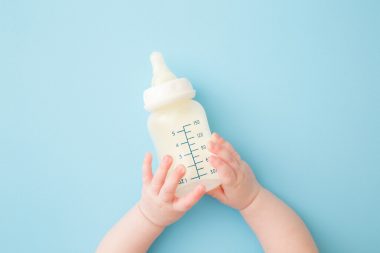Baby Girl Suffers Near-Fatal NEC After Consuming Premie Formula
New parents, K.L. and N.L., who are using their initials for their privacy, first heard of necrotizing enterocolitis (NEC) when their baby girl nearly died from the suspected condition at 10 days old. The newborn, M.L., was premature, delivered at just 30 weeks, along with her twin sister. After undergoing treatment, symptoms returned two weeks later.
Necrotizing enterocolitis, or NEC, is a serious and potentially fatal gastrointestinal disease that most often affects premature babies. Inflammation in the intestines can cause tissue to die. This may lead to holes in the intestines and bacteria leaking into the blood. NEC is fatal in 10% to 50% of cases, and in advanced disease mortality approaches 100%.
“We almost lost her, but thankfully, the nurses were able to catch it quickly and got her on antibiotics. The doctors stopped her feeds and were unable to clearly identify what had happened, though they presumed it was necrotizing enterocolitis,” said K.L.
“We almost lost her, but thankfully, the nurses were able to catch it quickly and got her on antibiotics. The doctors stopped her feeds and were unable to clearly identify what had happened, though they presumed it was necrotizing enterocolitis.”
Research as far back as the early 1990s has shown that NEC is six to 10 times more common in premature babies exclusively fed specific formulas. But K.L. and N.L. were never warned about the risks of cow’s milk formulas like the Similac Human Milk Fortifier that their baby was given in the NICU.
As of March 2025, Abbott, the maker of Similac, and Mead Johnson, the maker of Enfamil, face 663 lawsuits from caregivers whose babies developed NEC after consuming their brands’ baby formula.
M.L.’s parents have since begun the process of getting a lawyer to file a baby formula lawsuit. In an interview with Drugwatch, they share how nearly losing their baby girl twice changed them.
Mystery Illness Nearly Kills M.L. Twice
Serious complications while K.L. was pregnant with the twins required surgery, after which the unborn twins developed Twin Anemia Polycythemia Sequence (TAPS). K.L. described the issue as a rare and life-threatening condition in which one baby gave most of her blood supply to the other.
The babies were born prematurely, but the thankful parents were just happy the babies made it to 30 weeks gestation.
While still in the NICU, M.L. suddenly became very sick at 10 days old and just 2.5 pounds. Quick thinking by the nurses saved the baby girl’s life with antibiotics. Doctors suspected NEC. They stopped feeding her the specialty formula designed for babies born prematurely.
After feeds were reintroduced, M.L. nearly died a second time a couple of weeks later. The baby girl’s parents had to watch their daughter go from doing well to suddenly having serious digestive issues over and over.
“These illnesses continued, and the doctors were not sure what happened,” K.L. said. “It took a very serious emotional toll on our family. It was a constant roller coaster of emotions … It was hard to see her so uncomfortable because she was so hungry, but the doctors could not give her feeds since she couldn’t handle it.”
M.L. required multiple blood transfusions and treatment for anemia. Multiple X-rays were taken that didn’t reveal anything about her digestive issues.
Surgery Reveals NEC Diagnosis
When the illness wasn’t going away, M.L. went to Johns Hopkins. Doctors there performed exploratory surgery and immediately found the issue.
Baby M.L. had a stricture (narrowing) in her small intestine. Surgeons removed it and concluded she had NEC.
“We were shocked and very frustrated [when we found out about NEC and baby formula]. It really makes you question the motives of big pharma on a lot of levels.”
Luckily, M.L recovered after the surgery at Johns Hopkins with a few more weeks in the NICU. “She is still very sensitive to many foods and the long-term effects remain to be seen,” said K.L.
Shortly after that, the parents learned about the connection between NEC and baby formula.
“We were shocked and very frustrated [when we found out about NEC and baby formula]. It really makes you question the motives of big pharma on a lot of levels,” the upset mom said.
The Toll of NEC
Realizing their daughter nearly died twice from a condition they suspect was caused by baby formula is an experience K.L. and N.L. will never forget. They were supported by friends, family and the babies’ nurses throughout the harrowing emotional roller coaster.
“We also had great nurses on the twins’ ‘team’ in the NICU that we’re still very close to and spend time with today. They really cared for the girls so well,” K.L. said.
Beyond the emotional toll, the financial burden of the treatments was also trying. M.L. was in the NICU for more than 80 days.
“Blood transfusions, surgery, X-rays, tests all add up very quickly,” K.L. said. “Not to mention the in-utero surgery and care.”
“We used to mindlessly trust the pharmaceutical companies, but different issues in the recent past have really changed our views on a lot of things.”
The experience has forever changed them. And they still don’t know if M.L. will face more complications.
“We used to mindlessly trust the pharmaceutical companies, but different issues in the recent past have really changed our views on a lot of things.”
They also have a message for other parents.
“It’s important to do your research and know what is going into your kid’s body, and your own body, as it can often do more harm than good.”
Calling this number connects you with a Drugwatch.com representative. We will direct you to one of our trusted legal partners for a free case review.
Drugwatch.com's trusted legal partners support the organization's mission to keep people safe from dangerous drugs and medical devices. For more information, visit our partners page.


